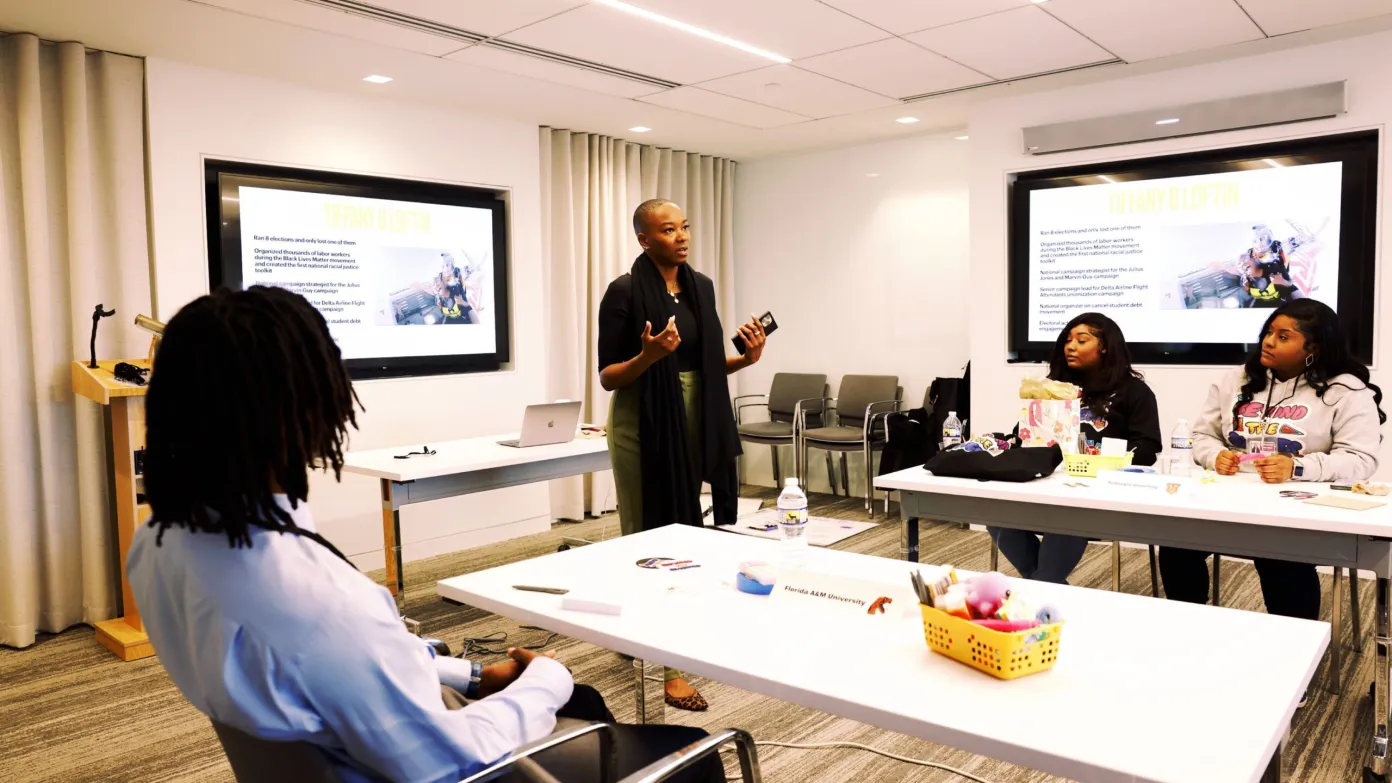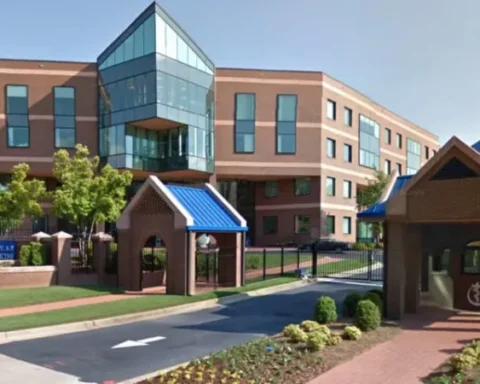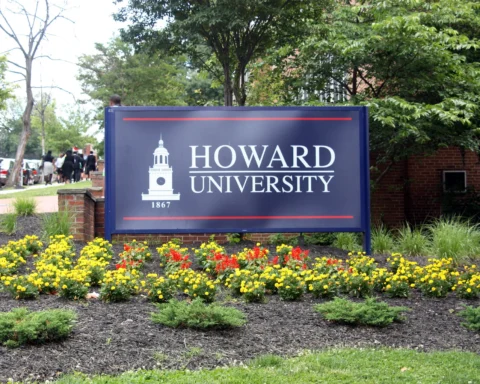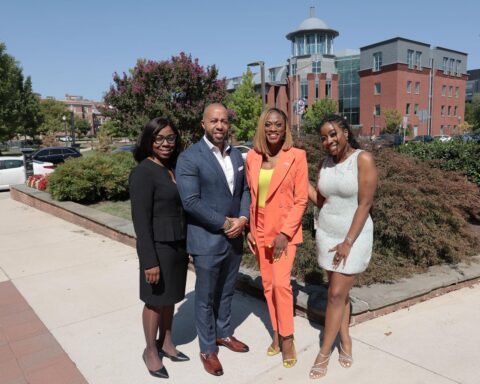By Quintessa Williams
“It was an opportunity we were blessed with,” says Wishchell Joseph, a senior at Tuskegee University, recalling when he first learned about the opportunity to become an ambassador for Beyond The Sheets.
Tougaloo College junior, Rokiyah Hobbs says she knew from the moment she received the email that she would be “a great asset and ambassador.”
Jackeima Fleming, a senior at The University of The Virgin Islands, saw the golden opportunity as an indication to “roll up their sleeves” in bringing this initiative to HBCU campuses.
One email brought 10 students across five Historically Black Colleges and Universities together for one crucial purpose. And the objective was clear. There was a critical need for comprehensive sexual and reproductive health education at HBCUs.
On December 1, 2023, Power to Decide announced the launch of ‘Beyond the Sheets’, a national student-led initiative aimed to address the sexual and reproductive health needs of students at Historically Black Colleges and Universities (HBCUs).
Power to Decide is a nonprofit, nonpartisan organization that works to advance sexual and reproductive well-being for all by providing trusted information, expanding access to quality services, and catalyzing culture change.
The December 1 launch date coincided with World AIDS Day, — an international day dedicated to raising awareness of the HIV/AIDS epidemic and honoring those who have passed from the disease.
“The vast majority of HBCUs are located in southern states, which accounts for more than half of all new HIV diagnoses in the United States,” said Power to Decide Senior Director of Health Equity, JeNeen Anderson.
“These states often have stringent laws that limit access to sex education, contraception and abortion and will greatly impact HBCU students’ reproductive well-being and sexual health. This highlights the importance of Power to Decide HBCU Student Ambassadors, as they will share valuable information and resources on campuses and social media to advance the reproductive well-being of their communities.”
Students from across five HBCUs were chosen to lead this initiative based on their demonstrated ability to inspire and shape the culture of how their peers receive, digest, and engage in sexual and reproductive health conversations.
- Angel Mayfield and Jabari Williams from Florida A&M University
- Nayla McClure and Rokiyah Hobbs of Tougaloo College
- Haileigh Trainer and Wischell Joseph of Tuskegee University
- Jackeima Flemming and Kurvonte Richards-Willett of the University of the Virgin Islands
- Jalah Bates and Mya Bledsoe of Xavier University of Louisiana
Since the initiative’s launch, the HBCU student ambassadors have focused their efforts on several key activities, including boosting social media engagement related to sexual health, addressing reproductive well-being, and implementing on-the-ground activation efforts on HBCU campuses.
“Addressing sexual and reproductive health needs on our campuses is paramount,” says Jalah Bates, a senior at Xavier University of Louisiana.
“It’s imperative to recognize the unique challenges faced by young Black individuals, including limited access to comprehensive sexual education, health disparities, and societal stigmas surrounding reproductive health.”
As Director Anderson emphasizes, most Historically Black Colleges and Universities are located in southern states with many students lacking access to sexual and reproductive health care and living in contraceptive and maternity care deserts. Historically black colleges and universities (HBCUs) — most of which arose after the Civil War to provide opportunities for higher learning to black students — are an integral aspect of the educational landscape in the South.
Power to Decide HBCU Student Ambassadors are positioned to fill the sexual and reproductive health care gap in their community by providing their peers with the information and resources they need to take control of their reproductive and sexual health care.
For Mya Bledsoe, also a senior at Xavier University, the initiative is a reminder that HBCU communities “deserve multifaceted measures to enhance access to education and reproductive well-being.”
Haileigh Trainer, a junior at Tuskegee University, echoes widening the gap where sexual education on HBCU campuses is concerned.
“Multifaceted initiatives such as comprehensive sexual education programs, ensuring accessible and culturally competent healthcare services, and addressing the stigma and discrimination surrounding HIV/AIDS is crucial to closing the disparity gap on our campuses.”
In an urgent bid to combat such sexual and reproductive health disparities, HBCUs like Xavier, FAMU, Tuskegee, Tougaloo, and The University of the Virgin Islands have already begun leading the effort by offering STD/HIV testing on campus, organizing panel discussions on sexual education and health, organizing initiatives centered on reproductive health, and a host of other commendable seminars and activities.
“At UVI, the school has installed condom dispensers all around the campus to make accessing contraceptives easier. Also, we’re now required to take a 30-minute course about sexual assault and sexual safety every semester before moving on campus,” — Kurvonte Richards-Willent, a student UVI.
The Beyond The Sheets initiative is not only an addition to these efforts but also substantiates the reality that there can never be too many solutions to addressing sexual health disparities in HBCU communities.
“The repercussions of our judgments are frequently the result of a lack of knowledge,” said Jalah and Mya from Xavier University. “We want to start a movement of freedom for our peers to ask questions, learn about contraception, and get the help they need to be their healthiest selves.”
Dr. Raegan McDonald-Mosley, CEO of Power to Decide emphasized the importance of HBCU students leading this important initiative in our communities.
“We are extremely excited to have students from five HBCU campuses using the power of their voice and the power of social media to give other students access to the information and resources they need to make informed sexual and reproductive health decisions.”
Bedsider, a program of Power to Decide, allows individuals to explore the full range of birth control options, browse sexual health FAQs, and find a healthcare clinic near them so they can take control of their reproductive well-being.
Nayla McClure and Rokiyah Hobbs from Tougaloo say they hope to ‘spark widespread conversation and lasting change.’ “I believe the initiative has the power to greatly influence the students on HBCU campuses and how we can use our collective power.”
University of Virgin Islands students Kurvonte Richards-Willet and Jackeima Fleming hope to ‘impact a younger generation’ on the taboo stigma around sex and ‘advocate for policy changes’ where it matters the most in our communities.





